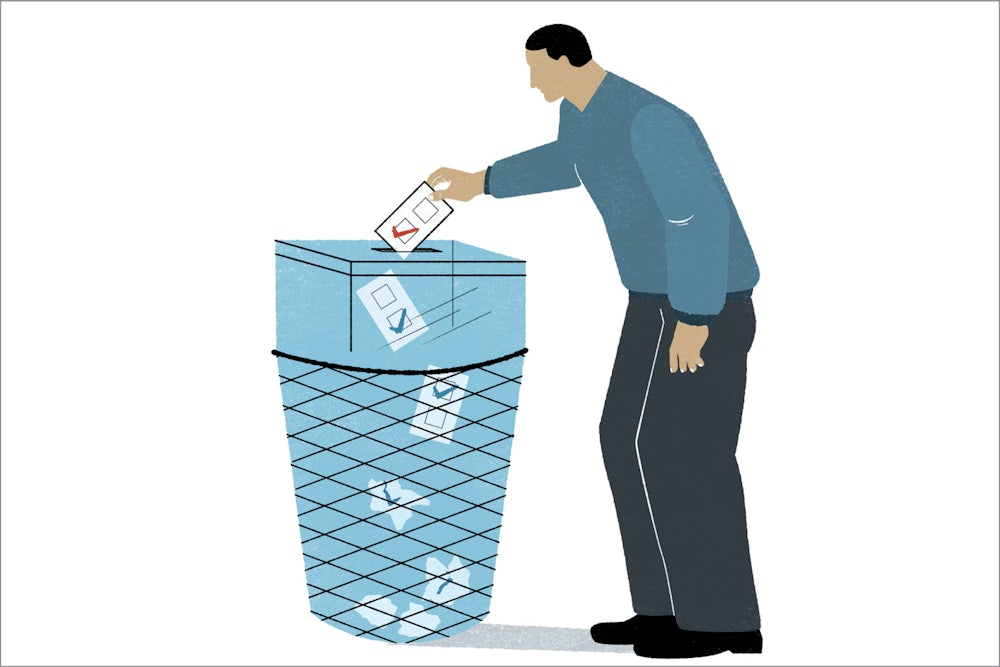During Barack Obama’s two terms in office, Democrats lost ground at the state level—a lot of ground. Republicans now dominate state legislatures to a greater degree than at any time since the Civil War, making it nearly impossible for Democrats to enact any meaningful policies in large swaths of the country. But in the midst of last year’s electoral wipeout, there was one bright spot: Citizens took the law into their own hands, introducing 71 ballot initiatives in 16 states—the most in a decade.
In Maine, citizens used ballot initiatives to increase the minimum wage and tax the rich to fund public schools. In South Dakota, they pushed through campaign finance reforms and restrictions on lobbying, as well as a system to create public funding for political campaigns. In Oklahoma, they reined in the War on Drugs, reclassifying nearly all felony drug possession charges as misdemeanors. And in Nevada, they mandated background checks for gun sales. In each case, citizens used ballot initiatives as a tool for direct democracy, using majority rule to push through policies that lawmakers are unable or unwilling to enact themselves.
But such victories have proved short-lived. Republican legislatures responded to the surge in civic participation by using their power to effectively overrule the will of the people—and to make it harder to enact citizen-backed reforms in the future. In South Dakota, state lawmakers simply repealed the voter-approved limits on campaign contributions and lobbying. In Maine, the state legislature threw out the voter-approved tax on the rich, and amended the minimum wage increase to exclude workers who receive tips. The state’s GOP governor, Paul LePage, boasted that there is nothing to prevent lawmakers from tossing out any ballot initiative they dislike. “If you read the constitution,” he crowed, “the legislature can just ignore it.”
It’s true that in twelve states, including Maine, there are no restrictions against such “legislative tampering” with citizen initiatives. And there are sometimes good reasons for lawmakers to make adjustments to ballot measures, especially if voters use them to infringe upon the constitutional rights of minorities. Ballot initiatives aren’t exclusively progressive tools, after all. In the early 2000s, conservatives used them to ban same-sex marriage in a number of states.
But the principle of direct democracy is a hallmark of the U.S. political system, stemming from the earliest days of the country. Ballot initiatives picked up steam during the Progressive Era, as a means for voters to push through reforms in the face of inept and intransigent politicians. South Dakota became the first state to adopt a statewide initiative process in 1898, and many others soon followed.
Veteran political observers say that the current conservative backlash against ballot initiatives is particularly extreme. “This stands out in recent history as one of the most brash years we’ve seen in the response by legislatures,” says Josh Altic, a project director at Ballotpedia, an organization that tracks ballot initiatives. And while state lawmakers frequently amend ballot initiatives, it violates the spirit of political participation to repeal them outright. “You should expect state legislatures to push back on these things, at least somewhat,” says Craig Burnett, a political scientist at Hofstra University. “But ignoring them altogether is different. It defeats the purpose of having direct democracy.”
In a preemptive strike, Republican legislatures are also making it harder for citizens to place initiatives on the ballot in the first place. Following the election, according to a report by Ballotpedia, lawmakers in 33 states introduced 186 bills to adjust the ballot-initiative process—often making it more restrictive. Both South Dakota and North Dakota established task forces designed to “reform” the initiative process, and Arizona banned advocacy groups from paying people for each signature they collect to place an initiative on the ballot—creating yet another hurdle in an already difficult process.
There are ways to protect ballot initiatives from legislative tampering. In California, voters must approve any move that legislators make to repeal or substantively alter initiatives. Other states permit repeal or amendment only by a supermajority vote of the legislature. And some states, like Nevada, prevent lawmakers from tampering with voter-approved initiatives until the measure has been enshrined in state law for a set number of years. Voters in South Dakota and Missouri are working to place similar protections on the ballot next year, in the form of constitutional amendments—which can’t be overturned by the legislature. “If those succeed,” says Altic of Ballotpedia, “you’ll see other states doing it, for sure.”
In an age of partisan gerrymandering and voter suppression, robust forms of direct democracy are more important than ever. Ballot initiatives give voters an essential means for passing laws that reflect the will of the majority, and Democrats should do whatever they can to protect the initiative process. But by definition, ballot initiatives are a tool of the powerless. If you have to try to pass a law yourself, it means your political party has failed. In the end, ballot initiatives are no substitute for Democrats finding a way to win control of state legislatures.
